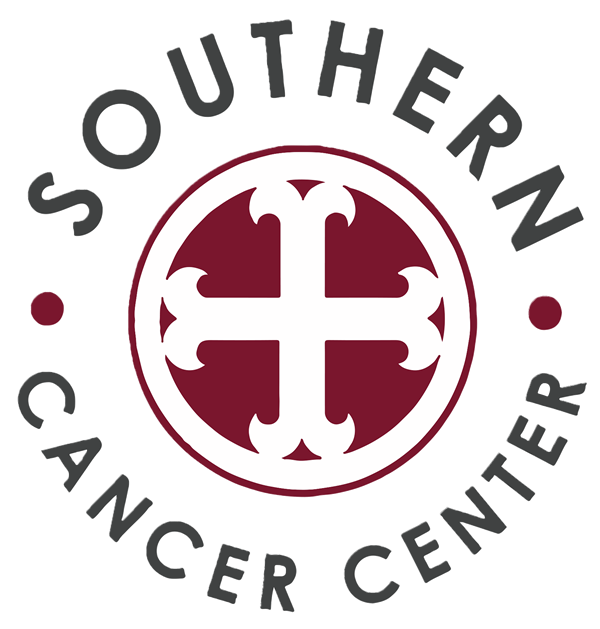Clinical Trials
Leading the Way In Cancer Research
At Southern Cancer Center, we play an active and leading role in cancer research through collaboration with The US Oncology Network. We offer clinical trials through Sarah Cannon Research Institute (SCRI), one of the world’s leading oncology research organizations conducting community-based clinical trials. SCRI has contributed to pivotal research that has led to the majority of new cancer therapies approved by the FDA today. These studies help to find better ways to treat cancer and give patients who are eligible to participate access to new investigational therapies that are otherwise not yet generally available. Every cancer is different for each patient and so is our approach to treatment. Our clinical research team evaluates the latest advances and treatments that meet the patient’s individual needs.
What Happens During a Clinical Trial
When someone chooses to take part in a clinical trial, the care they receive is much like the care they would otherwise receive. However, there is often additional monitoring for the purpose of learning about potential side effects and benefits of the clinical trial. Some trials simply test a study regimen, and all participants receive this same regimen. Other trials may compare a study regimen to the standard treatment. In this type of study, participants are randomly assigned to receive one or the other. Neither the participant nor their doctor can choose which one they will receive for important scientific reasons. Some people worry that they will not know which drug they are receiving or that they will receive a placebo, sometimes called a “sugar pill”. Placebos are never used in place of a treatment that is known to work. Participants will always be told before agreeing to take part if a placebo is going to be considered. Tests that are not part of standard care are covered by the research study.
Clinical Trial Resources
The US Oncology Network
www.usoncology.com
Sarah Cannon Research Institute
www.scri.com
National Cancer Institute
www.cancer.gov
American Cancer Society
www.cancer.org
CenterWatch
www.centerwatch.com
National Library of Medicine
www.clinicaltrials.gov
Cancer Support Community
www.cancersupportcommunity.org
Informed consent means that patients must be told the key facts about a clinical trial before deciding whether to take part. If the patient agrees to take part, the informed consent process involves signing a form that details the entire clinical trial, possible side effects, and potential risks and benefits. Participants may withdraw their decision to participate at any time for any reason.
Clinical trials are a vital part of the process in finding new cancer treatments. These research studies are conducted to determine if a study drug is safe and effective. Today’s research will guide the improvements for tomorrow’s cancer care.
The decision to take part in a clinical trial is a personal one. You may wish to talk to your family and loved ones, as well as members of your health care team before deciding. As with all current standard treatments, there can be possible risks as well as benefits from taking part in clinical trials. Study drugs may be found to be more or less effective than current standard treatments and have side effects not yet known. You will be informed of these risks as much as possible. Your health care team will give you the information you need to make the decision that is right for you.
Some cancer patients may participate because they are hoping for a possible cure and longer life or a way to feel better. Others find that the current standard therapies are not optimal for their cancer and wish to be among the first to participate in a research study and receive an investigational drug. Whatever the reason, participation could make a difference in a patient’s future, as well as in the lives of future cancer patients.
Benefit of the US Oncology Network
The US Oncology Network is a worldwide leader in cancer research, and as a part of The Network, Southern Cancer Center can offer our patients a chance to participate in some of the most advanced clinical trials available today, all right here in our local community. Practices across The US Oncology Network have enrolled over 70,000 patients across the country in over 1,500 clinical trials. Practices in The Network have also contributed to approximately one-third of all FDA-approved oncology therapies. Together, The US Oncology Network and Southern Cancer Center are committed to providing patients the opportunity for a better outcome and quality of life. Research participants with questions about clinical trials may visit by clicking below.
Clinical Trial Phases
Phase I
In Phase I clinical trials, researchers test a study drug in a small group of people (20 to 80) for the first time to evaluate its safety, determine a safe dosage range, and identify side effects.
Phase II
In Phase II clinical trials, the study drug is tested in a larger group of people (100 to 300) to measure its effectiveness and further evaluate its safety.
PHase III
In Phase III clinical trials, the study drug is tested in larger groups of people (1,000 to 3,000) to confirm its effectiveness, monitor side effects, compare it to approved standard treatments, and collect information that will allow the study drug to be used safely.
Phase IV
In Phase IV clinical trials, the drug is tested after it has been marketed to collect information about its effect in various populations and about any side effects associated with long-term use.
